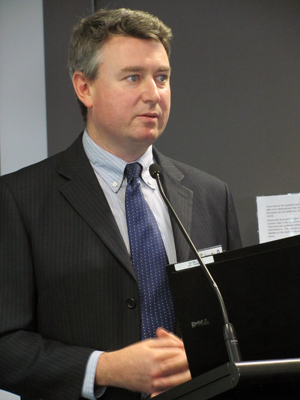Microsoft plugs researchers into the cloud

CSIRO, National ICT Australia (NICTA) and a number of Australian universities have received 4 million hours worth of free access per year to Microsoft's cloud computing platform Azure over the next three years.

Dr Ian Oppermann (Credit: Josh Taylor/ZDNet Australia)
Microsoft will provide access for the organisations to the Windows Azure cloud computing platform for three years, as well as technical support and tools to the organisations over that time period. ZDNet Australia understands that the grants are worth approximately US$3 million.
Microsoft eXtreme computing group director Dr Dennis Gannon said that science was about sharing information and data with other collaborators, and that the roll-out of the NBN would also provide benefits for using cloud computing in research.
"Australia is about to embark on a very impressive broadband initiative and the cloud is going to be [part of that as] a hub of computational infrastructure," he said.
NICTA's cloud computing research project leader Dr Anna Liu said that NICTA plans to use the platform to explore social network usage patterns as well as structured data patterns on the internet.
"This is a unique opportunity for us to conduct these studies at an unprecedented scale, so that we can address difficult real-world problems, such as those associated with the collection, management and sharing of information in large e-health systems," Liu said in a statement.
At the event, Liu told ZDNet Australia that the social network data was not specific to one platform such as Twitter or Facebook.
CSIRO will use Azure for projects focused on transport and logistics, but CSIRO ICT centre director Dr Ian Oppermann said that the platform would also be useful for a number of other projects underway at the CSIRO.
"We have a need for data, we have a means for generating data and we certainly have a need for computational power," he said. "There is absolutely no limit on the need and there is sensational appetite for computational resources and storage resources."
Oppermann said that the Square Kilometre Array (SKA) Pathfinder project was one such project. The project is expected to generate 10 petabytes of data per day.
The Australian National University and National Computational Infrastructure will be using Azure for computational chemistry packages. Researchers at the University of Melbourne and Monash University will work on e-science applications. Researchers at the University of Adelaide will be using Azure for a magnetotellurics platform, which provides electromagnetic imaging of the Earth's subsurface.
Earlier this week CSIRO and NICTA also launched a new broadband research laboratory located at the CSIRO's Marsfield site.